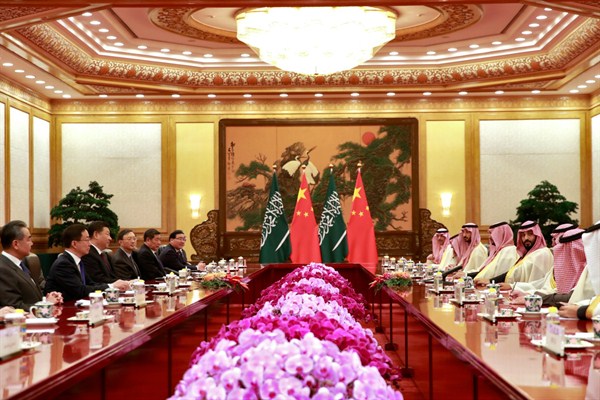Before Saudi Crown Prince Mohammed bin Salman arrived in Beijing for a major visit late last month, he was the target of an intense lobbying effort at home and abroad. Members of the Uighur diaspora in Saudi Arabia and beyond hoped the young, powerful royal would acknowledge China’s nationwide crackdown on its own Muslim population. For the past year, a state-sponsored campaign against expressions of Islamic piety has roiled Muslim communities throughout China—especially in the northwestern region of Xinjiang, where analysts now estimate that more than 1 million ethnic Uighurs have been detained in so-called “re-education camps.”
Instead, as he was greeted warmly in Beijing, the crown prince affirmed his support for the Chinese crackdown. According to China’s Xinhua News Agency, he told Chinese President Xi Jinping that Saudi Arabia respects “China’s rights to take counterterrorism and de-extremism measures to safeguard national security.” Although MBS, as the prince is known, did not specifically mention Xinjiang or the Uighur minority, his statement parroted the vocabulary Chinese officials have been using to justify their program of mass detention.
The crown prince’s willingness to legitimize Beijing’s tactics was not a surprise. Saudi leaders are reluctant to anger China, their country’s largest trading partner, at a moment of economic uncertainty. Riyadh is also fearful of transnational religious solidarity in many forms, including Iran’s attempts to spread its influence in the Arab world, Qatar’s backing of foreign Islamist movements, and the Islamic State’s claim to represent the world’s Muslims. That is why Saudi Arabia, on several occasions in the past, has issued statements supporting China’s harsh policies toward its Muslim minority. In 2009, for example, when Chinese security forces clashed with Uighur protesters in Xinjiang’s capital city of Urumqi, a spokesman for the Saudi Foreign Ministry proclaimed that “a good Muslim should be a good citizen, whether in China or any other country.”

